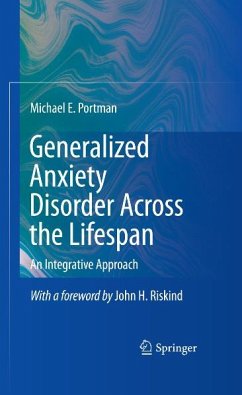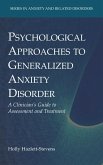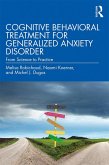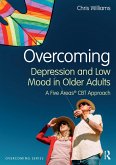Generalized anxiety disorder is a chronic, disabling, often lifelong condition affecting millions worldwide. Yet, despite its prevalence, GAD is frequently marginalized, misdiagnosed, and undertreated. Generalized Anxiety Disorder Across the Lifespan provides a practical knowledge base for GAD, identifying the symptoms that set it apart both from "normal, everyday" anxiety and from other anxiety-based pathologies, and thoroughly reviewing the range of established and cutting-edge treatments. The author's developmental approach sheds some light on longstanding clinical mysteries surrounding the disorder, among them the interplay of somatic and psychological symptoms and the changes in symptoms as patients age. Accessible to the novice or the veteran reader, the book:
Generalized Anxiety Disorder Across the Lifespan is a rich resource for clinicians, researchers, and graduate students looking to improve patients' quality of life-and the quality of their care. It is both a guide to current best practice and a springboard for future innovations. "In this clearly written volume, Michael Portman has succeeded in effectively applying his clinical experience and outstanding grasp of the conceptual and empirical literature to the understanding and treatment of Generalized Anxiety Disorder (GAD).He correctly emphasizes the need to tailor a pure or integrated treatment to the individual case based on the empirical evidence available and the clinician's judgment. One comes away from reading this splendid book exceedingly well informed about the best that the field has to offer those suffering from GAD." -Stanley B. Messer, PhD, Professor II and Dean, Graduate School of Applied and Professional Psychology, Rutgers University "In this book, Portman brings us up-to-date with the research that has firmly established GAD as a separate disorder. In an extensive review of the literature, he discusses various concepts of GAD, the attempts of defining and measuring the disorder and of quantifying its severity. Separate chapters describe the development and effectiveness of psychosocial and psychopharmacologic treatments in the general as well as in special GAD populations. Finally, this new publication discusses future research necessary to fully understand the disorder. The strength of the book is Portman's ability to present, objectively, diverse studies and views which enable the reader to form an independent opinion of the present state of GAD and the need for ongoing research. This volume is a valuable contribution and will be necessary reading for anybody interested in GAD." -Rudolf Hoehn-Saric, MD, Professor Emeritus of Psychiatry, Johns Hopkins University, School of Medicine
- Grounds readers in the basics of GAD
- Offers extensive discussion of the current psychosocial treatments for GAD
- Examines the state of the art in pharmacological therapies with explanations of the genetic and neurobiological correlates
- Explores special issues, cultural considerations, treatment resistant patients, and prevention
- Includes guidelines for treatment of GAD in children, adolescents, adults, and older adults
- Features ready-to-use assessment tools for patients across the lifespan
Generalized Anxiety Disorder Across the Lifespan is a rich resource for clinicians, researchers, and graduate students looking to improve patients' quality of life-and the quality of their care. It is both a guide to current best practice and a springboard for future innovations. "In this clearly written volume, Michael Portman has succeeded in effectively applying his clinical experience and outstanding grasp of the conceptual and empirical literature to the understanding and treatment of Generalized Anxiety Disorder (GAD).He correctly emphasizes the need to tailor a pure or integrated treatment to the individual case based on the empirical evidence available and the clinician's judgment. One comes away from reading this splendid book exceedingly well informed about the best that the field has to offer those suffering from GAD." -Stanley B. Messer, PhD, Professor II and Dean, Graduate School of Applied and Professional Psychology, Rutgers University "In this book, Portman brings us up-to-date with the research that has firmly established GAD as a separate disorder. In an extensive review of the literature, he discusses various concepts of GAD, the attempts of defining and measuring the disorder and of quantifying its severity. Separate chapters describe the development and effectiveness of psychosocial and psychopharmacologic treatments in the general as well as in special GAD populations. Finally, this new publication discusses future research necessary to fully understand the disorder. The strength of the book is Portman's ability to present, objectively, diverse studies and views which enable the reader to form an independent opinion of the present state of GAD and the need for ongoing research. This volume is a valuable contribution and will be necessary reading for anybody interested in GAD." -Rudolf Hoehn-Saric, MD, Professor Emeritus of Psychiatry, Johns Hopkins University, School of Medicine
Dieser Download kann aus rechtlichen Gründen nur mit Rechnungsadresse in A, B, BG, CY, CZ, D, DK, EW, E, FIN, F, GR, HR, H, IRL, I, LT, L, LR, M, NL, PL, P, R, S, SLO, SK ausgeliefert werden.
From the reviews:
"In this clearly written volume, Michael Portman has succeeded in effectively applying his clinical experience and outstanding grasp of the conceptual and empirical literature to the understanding and treatment of Generalized Anxiety Disorder (GAD). He brings a well-honed sensibility to the treatment of this recalcitrant condition that is at once open-minded, empirically-based, integrative and compassionate. Covering psychopharmacological, cognitive behavioral, psychodynamic and other treatments as applied to children, adolescents, adults and the elderly, the author correctly emphasizes the need to tailor a pure or integrated treatment to the individual case based on the empirical evidence available and the clinician's judgment. One comes away from reading this splendid book exceedingly well informed about the best that the field has to offer those suffering from GAD." -Stanley B. Messer, PhD, Professor II and Dean, Graduate School of Applied and Professional Psychology, Rutgers University
"In comparison to other anxiety disorders, Generalized Anxiety Disorder (GAD) was, for a long time, a neglected topic in psychiatric research in spite of being one of the most common and frequently disabling conditions. Perhaps the absence of dramatic symptoms, such as panic attacks and phobias, and the frequent comorbidity with other disorders that made its formulation difficult, led researchers to ignore GAD and to examine easier targets. Fortunately, recent studies corrected these omissions. In this book, Portman brings us up-to-date with the research that has firmly established GAD as a separate disorder. In an extensive review of the literature, he discusses various concepts of GAD, the attempts of defining and measuring the disorder and of quantifying its severity. Separate chapters describe the development and effectiveness of psychosocial and psychopharmacologic treatments in the general as well as in special GADpopulations. Finally, this new publication discusses future research necessary to fully understand the disorder. The strength of the book is Portman's ability to present, objectively, diverse studies and views which enable the reader to form an independent opinion of the present state of GAD and the need for ongoing research. This volume is a valuable contribution and will be necessary reading for anybody interested in GAD." - Rudolf Hoehn-Saric, MD, Professor Emeritus of Psychiatry, Johns Hopkins University, School of Medicine, Baltimore, MD
"Generalized anxiety disorder across the lifespan: An integrative approach is well-cited with relevant and up-to-date articles. There are 37 pages of references ... . The book is a very valuable tool for clinicians, whether they work in a mental health setting or are in general medical practice. It covers all aspects of GAD: biological, social, psychological, and medical. It also has valuable insights and recommendations using the highest standard of care in helping the GAD patient." (Stephanie Sarkis, Metapsychology Online Reviews, Vol. 14 (49), December, 2010)
"The author achieves all of these objectives in a book that is logically organized, well-written, and comprehensive in its coverage of the existing empirical literature. ... This manual represents an objective and thorough review of ... Generalized Anxiety Disorder, and is equally useful to clinicians and researchers at various levels of expertise. ... In its current iteration, this book provides both a solid grounding in the current state of the art, as well as timely and cogent suggestions for innovation and future research." (Michele Boivin, Cogntitive Behavioral Therapy, Vol. 7 (1), 2011)
"In this clearly written volume, Michael Portman has succeeded in effectively applying his clinical experience and outstanding grasp of the conceptual and empirical literature to the understanding and treatment of Generalized Anxiety Disorder (GAD). He brings a well-honed sensibility to the treatment of this recalcitrant condition that is at once open-minded, empirically-based, integrative and compassionate. Covering psychopharmacological, cognitive behavioral, psychodynamic and other treatments as applied to children, adolescents, adults and the elderly, the author correctly emphasizes the need to tailor a pure or integrated treatment to the individual case based on the empirical evidence available and the clinician's judgment. One comes away from reading this splendid book exceedingly well informed about the best that the field has to offer those suffering from GAD." -Stanley B. Messer, PhD, Professor II and Dean, Graduate School of Applied and Professional Psychology, Rutgers University
"In comparison to other anxiety disorders, Generalized Anxiety Disorder (GAD) was, for a long time, a neglected topic in psychiatric research in spite of being one of the most common and frequently disabling conditions. Perhaps the absence of dramatic symptoms, such as panic attacks and phobias, and the frequent comorbidity with other disorders that made its formulation difficult, led researchers to ignore GAD and to examine easier targets. Fortunately, recent studies corrected these omissions. In this book, Portman brings us up-to-date with the research that has firmly established GAD as a separate disorder. In an extensive review of the literature, he discusses various concepts of GAD, the attempts of defining and measuring the disorder and of quantifying its severity. Separate chapters describe the development and effectiveness of psychosocial and psychopharmacologic treatments in the general as well as in special GADpopulations. Finally, this new publication discusses future research necessary to fully understand the disorder. The strength of the book is Portman's ability to present, objectively, diverse studies and views which enable the reader to form an independent opinion of the present state of GAD and the need for ongoing research. This volume is a valuable contribution and will be necessary reading for anybody interested in GAD." - Rudolf Hoehn-Saric, MD, Professor Emeritus of Psychiatry, Johns Hopkins University, School of Medicine, Baltimore, MD
"Generalized anxiety disorder across the lifespan: An integrative approach is well-cited with relevant and up-to-date articles. There are 37 pages of references ... . The book is a very valuable tool for clinicians, whether they work in a mental health setting or are in general medical practice. It covers all aspects of GAD: biological, social, psychological, and medical. It also has valuable insights and recommendations using the highest standard of care in helping the GAD patient." (Stephanie Sarkis, Metapsychology Online Reviews, Vol. 14 (49), December, 2010)
"The author achieves all of these objectives in a book that is logically organized, well-written, and comprehensive in its coverage of the existing empirical literature. ... This manual represents an objective and thorough review of ... Generalized Anxiety Disorder, and is equally useful to clinicians and researchers at various levels of expertise. ... In its current iteration, this book provides both a solid grounding in the current state of the art, as well as timely and cogent suggestions for innovation and future research." (Michele Boivin, Cogntitive Behavioral Therapy, Vol. 7 (1), 2011)
"In this clearly written volume, Michael Portman has succeeded in effectively applying his clinical experience and outstanding grasp of the conceptual and empirical literature to the understanding and treatment of Generalized Anxiety Disorder (GAD). He brings a well-honed sensibility to the treatment of this recalcitrant condition that is at once open-minded, empirically-based, integrative and compassionate. Covering psychopharmacological, cognitive behavioral, psychodynamic and other treatments as applied to children, adolescents, adults and the elderly, the author correctly emphasizes the need to tailor a pure or integrated treatment to the individual case based on the empirical evidence available and the clinician's judgment. One comes away from reading this splendid book exceedingly well informed about the best that the field has to offer those suffering from GAD." -Stanley B. Messer, PhD, Professor II and Dean, Graduate School of Applied and Professional Psychology, Rutgers University "In comparison to other anxiety disorders, Generalized Anxiety Disorder (GAD) was, for a long time, a neglected topic in psychiatric research in spite of being one of the most common and frequently disabling conditions. Perhaps the absence of dramatic symptoms, such as panic attacks and phobias, and the frequent comorbidity with other disorders that made its formulation difficult, led researchers to ignore GAD and to examine easier targets. Fortunately, recent studies corrected these omissions. In this book, Portman brings us up-to-date with the research that has firmly established GAD as a separate disorder. In an extensive review of the literature, he discusses various concepts of GAD, the attempts of defining and measuring the disorder and of quantifying its severity. Separate chapters describe the development and effectiveness of psychosocial and psychopharmacologic treatments in the general as well as in special GAD populations. Finally, this new publication discusses future research necessary to fully understand the disorder. The strength of the book is Portman's ability to present, objectively, diverse studies and views which enable the reader to form an independent opinion of the present state of GAD and the need for ongoing research. This volume is a valuable contribution and will be necessary reading for anybody interested in GAD." - Rudolf Hoehn-Saric, MD, Professor Emeritus of Psychiatry, Johns Hopkins University, School of Medicine, Baltimore, MD









